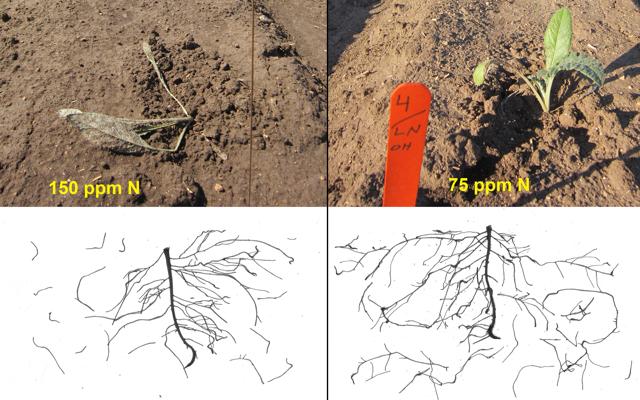
Boosting Artichoke Root Growth and Transplant Quality

A study of globe artichoke determined impacts of pretransplant management of nitrogen and fertigation system on transplant quality and subsequent growth. Photos show artichoke transplant roots after 8 week of fertigation using 150 and 75 ppm N solution (top), and evaluation of transplant stem plasticity and root quality determined by using a digital force attached to a vertical motorized force tester (bottom).
Photo courtesy of Daniel Leskovar
According to the authors of a new study, transplant shock is very common in globe artichoke grown in semiarid regions of the United States; high air temperatures and drought stress after transplanting can delay root and shoot growth and significantly reduce marketable yield.
To counteract the effects of heat and insufficient irrigation on artichoke crops, researchers are seeking to determine the best nursery practices for plant nutrition and irrigation.
The researchers also set out to determine if the fertigation method and nitrogen level used in the nursery significantly modifies early vegetative growth or yield when artichokes are grown under surface, subsurface, and overhead linear irrigation.
Leskovar and Othman said the study results (HortScience, May 2016) can be used to improve transplant quality and stand establishment of globe artichoke when transplanted in hot and drought-prone environments.
Artichoke transplants fertilized with 75 mg·L-1 N (low N) had improved root length and surface area and produced shorter and compact transplants, resulting in seedlings more tolerant to field stresses after transplanting in the field. Analyses also showed that artichoke transplants with low level N did not result in yield reductions as compared with transplants grown with high N level under linear, surface, and subsurface drip irrigation.
“This is the first study of globe artichoke that addressed the impact of pretransplant management of nitrogen and fertigation system on transplant quality and subsequent growth, physiology, and yield responses under three distinctive field irrigation systems,” the authors noted.
“It demonstrates the importance of N level on improving the overall transplant root system and growth components of globe artichoke containerized transplants and the subsequent adaptation to irrigated field conditions in a semiarid environment.”
###
The complete study and abstract are available on the ASHS HortScience electronic journal web site: http://hortsci.
Founded in 1903, the American Society for Horticultural Science (ASHS) is the largest organization dedicated to advancing all facets of horticultural research, education, and application. More information at ashs.org.












